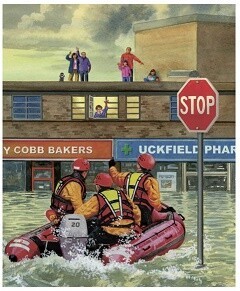The Prince and the Ladybird
Glen Newey
His Royal Highness the Prince Charles Arthur Philip George, Prince of Wales and nob of much else, has written a Ladybird book on climate change. Naturally, as with other tasks such as brushing one’s teeth and providing one’s urine sample, this is not a feat the dauphin has pulled off solo. He’s roped in Tony Juniper of Friends of the Earth (FoE) and Emily Shuckburgh of the British Antarctic Survey for a spot of authorial toothpaste-squirting and flask-holding. Penguin, which owns Ladybird, apparently tapped seven specialists to wrestle with the 5000-word spider-written MS in order, as Roland White of Penguin put it, to ‘amend some of the more assertive language to ensure it was bulletproof’.
The book follows Ladybird’s recent spoof series on such grown-up themes as the mid-life crisis and the hangover, formatted and splodgily illustrated in the style of its crown octavo kiddie-reader series from the 1960s. Climate Change is intended to herald a new line of ‘serious’ books in similar format written by ‘experts’, presumably aimed at wooing the ubiquitous post-ironic alcopop/kidult demographic.
The consequences, if not the causes, of climate change aren’t much of a gas, and Climate Change’s Norman-Rockwell-by-numbers cover shows a rescue dinghy bobbing past a STOP sign – in Uckfield, of all places. It’s speeding away from the direction of Waitrose, possibly with a swag-bag of looted Duchy Originals on board. In the real-life photos from the Uckfield floods of 2000, on which the cover pic is based, the Oxfam shop is all but submerged: when the wrath of the heavens descends, the rains will fall on the just and unjust alike. In the Ladybird graphic, it’s a baker and chemist that get it. Various stricken Uckfielders wave from the roofs; my sister, who lives nearby, says she thinks she recognises the woman from the dry-cleaners.
The LRB royal correspondent, jammed to the craw with canapés and cucumber butties, understands that it’s possible to weary of the gaitered footmen and crash-test dummy quadrille of court. The jaded hack can sympathise with one’s yearning to flee the glabrous jankers of St James’s and meet some real folk, even authors – the problem being that as soon as one gets outside, everyone behaves as people behave when Prince Charles is around. It’s like King Midas’s predicament, but with obsequiousness for gold. Once the misperceptions are fed back in, the upshot is the merrie England of Poundbury, his toy village in Dorset, rather than Poundland.
Charles’s status as an eco-ayatollah – another bid to prove there’s more than air inside the old toby jug – is hardly news, least of all to government ministers, but it hasn’t stopped him amassing a carbon footprint the size of Uranus. That goes not just for his princely peregrinations round the globe but also for his Duchy Originals bio-biz. A few years back DO shipped bottles of Royal Deeside water to the Gulf, a contribution to Britain’s export drive described by Craig Bennett of the prince’s sometime friends at FoE as ‘insane’.
The superabundance of water seems to be something of a leitmotiv. Even before Climate Change, the prince was a published author, and a children’s author at that. Apparently his storytelling skills were honed at Balmoral on a captive audience: his younger brothers Andrew and Edward (from them, Charles was but a small step away from hobnobbing with root vegetables). The Old Man of Lochnagar (1980) relates the environmental disaster wrought by a troglodyte’s insistence on having a hot bath. When the much smaller pixies of Gorm living nearby are swamped by the outflow, their business is ruined, and the fire to heat the bath threatens to engulf the world. The caveman shrinks to the size of the little people and realises the devastation he has wrought. But he can only fix things by being restored to his normal, i.e. giant, size. He ends up having a bath with all the pixies. It’s hard to know whether to read this as a mea culpa or a cry for help.

Comments
It's astonishing that he has yet to be awarded a Nobel.
As much as we like to pour scorn on the current heir, "his" book is probably still a Good Thing.
As Mark Donney, son of a former Chairman and Chief Executive of Penguin wrote, far from trying to ban her work, Penguin should have awarded her a commission.